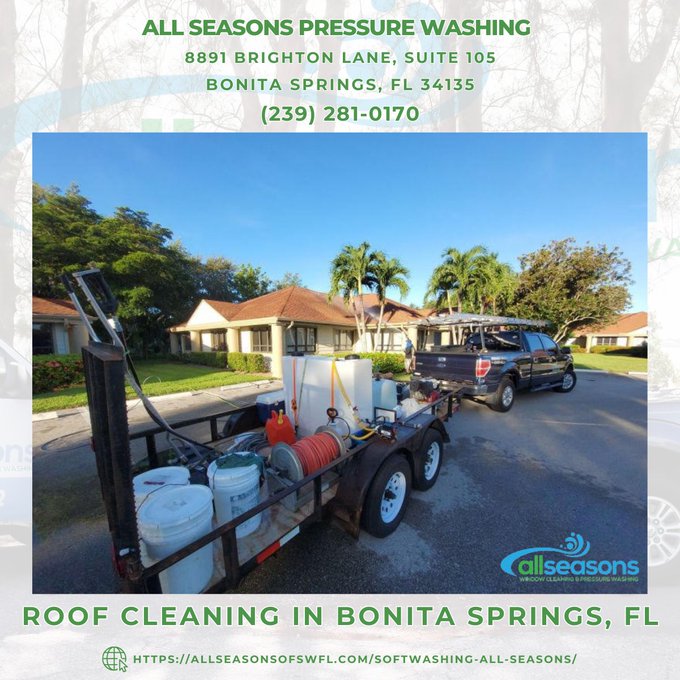Keeping a roof clean may not be the most glamorous Cape Coral roof maintenance home maintenance task, but it's one of the most important. A well-maintained roof protects your home from the elements and can significantly extend its lifespan. But when is the best time for that all-important roof cleaning? Let's dive into the intricacies of seasonal maintenance and explore everything you need to know about cleaning your roof.
Why Is Roof Cleaning Important?
Roof cleaning isn't just about aesthetics; it's essential for maintaining the health of your home. Over time, roofs accumulate dirt, moss, algae, and other debris that can lead to significant issues if left unchecked.
- Prevention of Damage: Regular cleaning prevents damage caused by moss or algae growth, which can deteriorate roofing materials. Boosting Lifespan: A clean roof adds years to its lifespan, saving homeowners money in the long run. Energy Efficiency: A clean roof reflects sunlight better than a dirty one, potentially lowering cooling costs in hot months.
Is Roof Cleaning a Good Idea?
Absolutely! Regular roof cleaning is a proactive measure that can save you money on repairs and prolong your roof's life. It’s particularly crucial if you live in an area prone to heavy rain or humidity, which fosters mold and mildew growth.
What Happens If You Don't Clean Your Roof?
Neglecting regular maintenance leads to a myriad of problems:
Structural Damage: Algae and moss can retain moisture, causing shingles to warp or rot. Ice Dams: In colder climates, accumulated debris can lead to ice dam formation during winter. Decreased Home Value: A poorly maintained roof can deter potential buyers if you ever decide to sell your home.Seasonal Maintenance: When is the Best Time to Clean Your Roof?
Knowing when to clean your roof is as crucial as knowing how. Typically, spring and fall are ideal times for roof maintenance.
Spring Cleaning: The Aftermath of Winter
After a harsh winter, it’s essential to inspect your roof for any damage like missing shingles or leaks caused by ice dams.
- Check for debris accumulation from winter storms. Clear out gutters that may have collected leaves and branches.
Fall Cleanup: Preparing for Winter
As autumn arrives and trees shed their leaves, make it a point to clear your roof of fallen leaves:
- Prevent leaf buildup in gutters that could lead to water pooling on the roof. Inspect for any signs of wear that could worsen during winter.
How Often Should Your Roof Be Cleaned?
Generally speaking, roofs should be cleaned every 1-3 years depending on various factors:
- Climate Conditions: Humid areas may require more frequent cleanings due to mold growth. Surrounding Vegetation: Trees nearby might drop leaves or branches more often.
What Is Soft Wash Roof Cleaning?
Soft washing is an effective method that uses low-pressure water combined with specialized cleaning solutions tailored for roofs. This technique allows thorough cleaning without damaging shingles or tiles.
What Is the Best Method of Roof Cleaning?
The best method varies based on your roofing material:
For asphalt shingles: Soft washing is recommended. For metal roofs: Pressure washing at low PSI works effectively without causing scratches.Is Pressure Washing Your Roof a Good Idea?
While pressure washing may seem like an efficient solution, it can actually damage shingles if done improperly. Here are some pros and cons:
| Pros | Cons | |---------------------------|-------------------------------| | Quick removal of dirt | Risk of shingle damage | | Effective on hard surfaces | May void warranties |
Can I Clean My Roof Myself?
Yes! However, DIY cleaning requires caution:
- Use safety gear such as gloves and non-slip shoes. Avoid walking on steep roofs; use ladders carefully.
Should I Spray My Roof? What Chemical Is Used?
When considering chemical treatments:
Use biodegradable options specifically designed for roofs. Common chemicals include sodium hypochlorite (bleach) and detergents suited for soft washing.How Do Professionals Clean Roofs?
Most professionals utilize soft wash techniques with specialized equipment designed for safe application. They assess the type of roofing material beforehand to choose appropriate methods.
Should You Rinse a Roof After Washing?
Yes! Rinsing ensures that no chemical residues remain that could harm plants or degrade roofing materials over time.
What Can I Spray on My Roof to Rejuvenate It?
Look for commercial products labeled as roof rejuvenators; these often contain polymers designed to restore flexibility and protect against UV rays.
FAQs
Q1: How much does it cost to coat a roof?
A: Costs vary widely depending on material type but typically range from $1-$4 per square foot.
Q2: How long does it take to clean a roof?
A: Most professional cleanings take between 2-4 hours depending on size and condition.
Q3: Can I walk on my roof to clean it?
A: It’s possible but risky; consider hiring professionals if unsure about stability.
Q4: What are the cons of pressure washing roofs?
A: Pressure washing may strip protective granules from shingles leading to faster deterioration over time.
Q5: How do I clean my roof without damaging it?
A: Using soft wash methods ensures gentle yet effective cleaning while preserving your roofing material's integrity.
Q6: Does roof cleaning extend the life of a roof?
A: Yes! Regular maintenance prevents structural damage thereby extending overall lifespan significantly!
Conclusion
In closing, regular seasonal maintenance through effective cleaning practices plays an integral role in extending your home's life expectancy while promoting energy efficiency. By understanding when and how best to clean your rooftop—whether through DIY efforts or professional help—you’ll invest wisely in protecting one of your biggest assets! Remember, keeping up with this task will not only preserve its beauty but also enhance its functionality over time. So roll up those sleeves or call in experts; either way makes sense!
This article has provided comprehensive insights into seasonal maintenance strategies surrounding rooftop care while addressing common queries related directly or indirectly tied into this topic area—ensuring readers leave informed!
